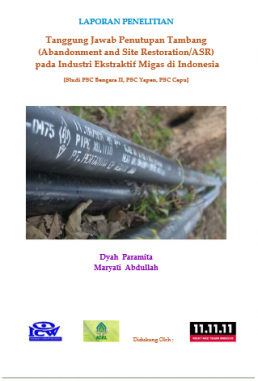This is a research report conducted by Dyah Paramita and Maryati Abdullah in 2010 regarding the Responsibility of Mine Closure (Abandonment and Site Restoration / ASR) in the Oil and Gas Extractive Industries in Indonesia, for studies in the Bengara II PSC, Yapen PSC, and Cepu PSC. This research was conducted by the Indonesia Corruption Watch (ICW) in collaboration with the Indonesian Center for Environmental Law (ICEL) with the support of Vecht Mee Tegen Onrecht (11.11.11).
Following are the conclusions and recommendations resulting from this study:
Conclusion:
- The international community is of the view that the precautionary principle needs to be applied at the stage of decommissioning and implementation of ASR. This gives the consequence of total attention on the implementation of ASR, lest the installation which reaches the operating period is ignored and causes problems in the future. Indonesia has not yet ratified the London convention, this opens up opportunities for mining practices to dump in Indonesia that are not in accordance with the provisions of the London convention. Even though Indonesia signed UNCLOS, it is not enough that UNCLOS does not regulate the waste dumping aspects of oil and gas activities.
- In Indonesia, ASR reserve funds cannot be returned to the Contractor but ASR costs are operational funds according to PP No. 79 of 2010 is a cost recovery, this will be done with the MCAR principle so that the funds allocated are equal to the real costs.
- The PSC in the initial generation did not clearly regulate the obligations of ASR, but in the PSC basically the Government has a well and facilities which are then operated by a contractor where the operating costs are borne by the government through cost recovery. Under international law, the owner of an oil and gas facility has an obligation to conduct ASR. Because at the end of the PSC the Government has the right to oil and gas facilities, the Government is also responsible for the ASR. When cost recovery is formulated based on the PSC system, this may go unnoticed, but unfortunately the ASR cost burden is something that must be borne by the state due to ownership of the facility.
- In the Bengara II PSC, Yapen and Cepu in general have listed obligations regarding ASR funds and the implementation of ASR, and the implementation of these needs to be made more detailed. Renewal of the ASR concept or further regulation of ASR is not an obstacle because in the Cepu PSC for example, in clause 5.1.20 it requires the contractor to obey applicable Indonesian law. It is also understood that the execution of work programs must be carried out without causing conflicts with obligations imposed by international obligations.
- In this case the contractor must adjust to these obligations as a form of compliance with Indonesian law. Then, good ASR implementation is an international obligation where Indonesia is bound by UNCLOS.
- ASR funds are operational costs that will be returned (cost recovery component), this is a big deduction factor for the country’s profits from oil and gas activities. For this matter it is necessary to consider and further investigate whether the form of PSC will continue to be used for onshore and offshore activities, or be distinguished as is the Nigerian model that uses JOA for onshore activities and PSC for offshore activities. It should be considered that the cost of ASR is not only borne by the state but is shared by the actors involved in oil and gas operations.
Recommendation:
- ASR arrangements for both fund management and implementation need to be more detailed, can be accommodated in Abandonment Agreements such as in the UK and generally accommodated in regulations.
- Decommissioning (or ASR) differentiation is needed for onshore and offshore activities from standards, management and regulations.
- Further studies are needed regarding ASR funds, aspects of calculation, management and criticism of ASR and MCAR cost recovery (do the proportions need not be modified?)
- Indonesia needs to consider ratifying the London Convention considering that the London Convention contains aspects of waste dumping from oil and gas activities, besides the London Dumping Convention secretariat also provides capacity building for the parties, this can help Indonesia to increase capacity.
- If necessary, Indonesia can form a Regional Convention that is expected to address the problem of marine pollution due to oil and gas activities including ASR offshore that has the potential to occur in the waters of ASEAN or the Asia Pacific region.
- There is a need for information disclosure at BP Migas, including contract transparency, oil and gas governance guidelines and documents, oil / gas platform / operation data. This can provide discussion space and scientific dialogue to the public to be able to participate in reviewing, proposing improvements to the Oil and Gas governance policy to the Government and overseeing the implementation of Oil and Gas operations.
- In the framework of sustainable development, residual responsibility is an important aspect. After the ASR is carried out it is necessary to ensure who is responsible for maintenance, monitoring and if there is damage and environmental impact, and if obligations arise for future generations.
- The Indonesian PSC model has not yet arranged in detail about ASR, nor has PTK and the existing laws and regulations. Further compiled on the standards of recovery, differences in the implementation of ASR on onshore and offshore, transparency and access to information to the community.
